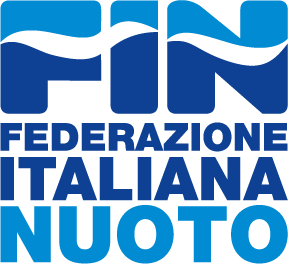Campionati Italiani pallanuoto. Risultati delle finali e classifiche
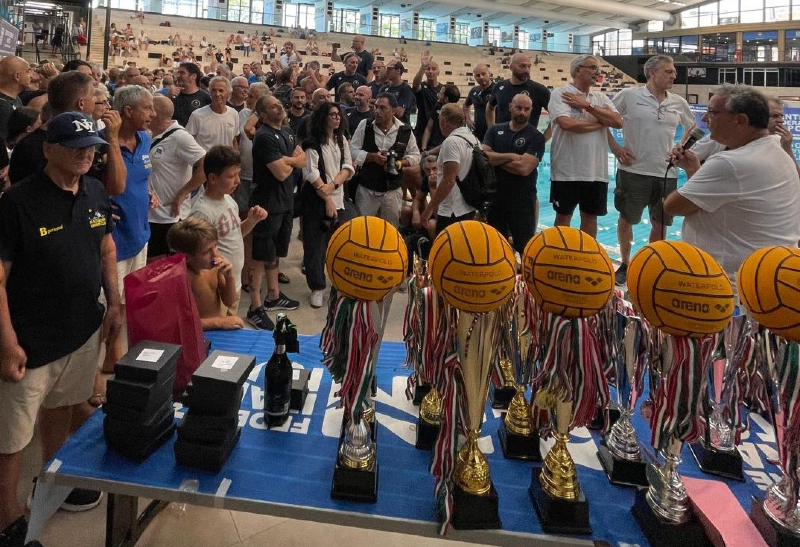
Si sono conclusi i Campionati Italiani Master di pallanuoto. Cinque giornate di incontri a Napoli, al Centro Federale "Felice Scandone", in due vasche attigue e su quattro campi per un totale di 96 partite disputate. I campionati di nuoto e nuoto artistico si sono già disputati a Riccione; quelli in acque libere sono in programma a Piombino dal 6 all'8 settembre e quelli di tuffi a Torino dal 6 all'8 dicembre. Seguono i risultati delle finali.
Campionati Italiani pallanuoto master - 7^ giornata, 14 luglio
45+ M Finale 3°/4° Rn Sori-An Brescia 4-8
55+ M Finale 3°/4° Nuoto 2000 Napoli-Waterpolo Mi Metanopoli 5-12
30+ M Finale 3°/4° Waterpolo Mi Metanopoli-Firenze Pallanuoto 10-7
50+ M Finale 3°/4° Waterpolo Mi Metanopoli-Firenze Pallanuoto 2-1
30+ M Finale 1°/2° An Brescia-Vintage Torino ‘81 3-6
40+ F Finale 1°/2° Water Sports Napoli Lions-Ssd Nuotatori Civitavecchiesi 5-11
40+ M Finale 3°/4° Waterpolo Mi Metanopoli-Firenze Pallanuoto 4-16
30+ M Finale 5°/6°/7° 3^A-3^B Atlantide Elmas-Pn. Milano 5-14
40+ M Finale 1°/2° Ischia Marine Club-Europa Sporting Roma 12-7
55+ M Finale 1°/2° Europa Sporting Roma-Vintage Torino ‘81 14-5
30+ F Finale 1°/2° Team Marche Pallanuoto Moie-Sis Roma 4-9
65+ M Finale 1°/2° Europa Sporting Roma-Nuoto 2000 Napoli 8-9
45+ M Finale 1°/2° Europa Sporting Roma-Pn Milano 10-6
50+ M Finale 1°/2° Telimar Palermo-Rn Napoli 8-7
60+ M Finale 1°/2° Nuoto 2000 Napoli-Europa Sporting Roma 9-7
Classifiche femminili
F30+
1. SIS Roma
2. Team Marche Pallanuoto Moie
F40+
1. Nuotatori Civitavecchiesi
2. Water Sports Napoli Lions
F45+
1. Water Sports Napoli Lions
Classifiche maschili
M30+
1. Vintage Torino 81
2. AN Brescia
3. WP Milano Metanopoli
4. Firenze Pallanuoto
5. PN Milano
6. RN Savona Liguria Master WP
7. Atlantide Elams
M40+
1. Ischia Marine Club
2. Europa Sporting Roma
3. Firenze Pallanuoto
4. WP Milano Metanopoli
M45+
1. Europa Sporting Roma
2. PN Milano
3. AN Brescia
4. RN Sori
5. Telimar
6. RN Camogli Camonaco
M50+
1. Telimar
2. RN Napoli
3. WP Milano Metanopoli
4. Firenze Pallanuoto
5. Milan Watersport Academy
M55+
1. Europa Sporting Roma
2. Vintage Torino 81
3. WP Milano Metanopoli
4. Nuoto 2000 Napoli
M60+
1. Nuoto 2000 Napoli
2. Europa Sporting Roma
3. RN Napoli
M65+
1. Nuoto 2000 Napoli
2. Europa Sporting Roma
3. Nuotatori Civitavecchiesi
foto carlodisanto.com


















































































































Campionati Nuoto Herbalife. Vincono Acqua1village e Klab Sport
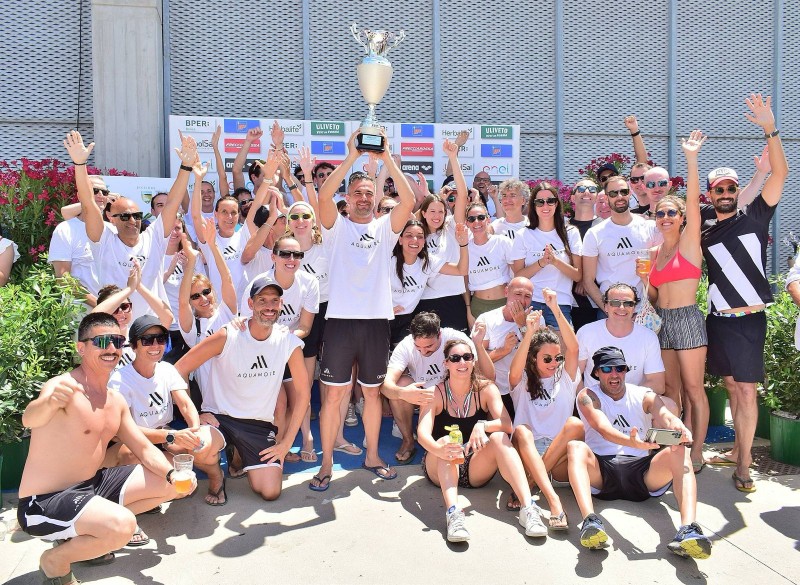
In tremilasettecento hanno festeggiato i 40 anni dei campionati nazionali master di nuoto. Cinque giornate di gare, allo Stadio del Nuoto di Riccione, in un’atmosfera di festa, sport, benessere e condivisione. E tanti record italiani ed europei come da tradizione. La Acqua1village in campo femminile con 143 punti e il Klab Sport in ambito maschile con 151 hanno vinto le classifiche di società. I campionati master Herbalife 2024 continuano con il nuoto artistico da 5 al 7 luglio sempre a Riccione. I campionati master di pallanuoto sono previsti a Napoli dal 10 al 14 luglio, quelli in acque libere a Piombino dal 6 all'8 settembre e di tuffi a Torino dal 6 all'8 dicembre.
GRAN FINALE CON I VETERANI DELLA POLISPORTIVA NADIR, OLTRE 320 ANNI IN 4
Il fine settimana clou dei campionati si apre con i 100 rana e i 100 dorso che anticipano i 50 stile libero con i suoi 1704 iscritti (1079 in campo maschile e 625 tra le donne) e le staffette miste femminili e maschili (oltre 400 formazioni) che chiuderanno la giornata di sabato per poi proseguire con le 3 staffette a stile libero che si svolgeranno tutte nella mattinata di domenica.
Nella mattinata di sabato Orietta Negri (M70) migliora il primato dei 100 dorso che già le apparteneva con il tempo di 1’34”41. Sempre le nostre nuotartici master fanno segnare i nuovi primati italiani della giornata: Eleonora Sechi (M30) ferma il cronometro dopo 27”27 migliorando il precedente primato di 22 centesimi di Alfonsina Irace che durava da 15 anni e l’inossidabile Olessia Bourova che continua nella sua storica sequenza dei record nella distanza breve dello stile libero con il nuovo primato della categoria M45 in 27”90, con 2 centesimi meno del tempo fatto registrare un mese fa.
Tra le staffette miste da evidenziare il record della formazione femminile di Milano Nuoto Master, categoria M100, che porta il primato nazionale a 2’05”04 sopravanzando la Klab Sport, precedente detentrice del record, stabilito solo qualche settimana fa, e che a sua volta aveva migliorato la sua stessa prestazione con il tempo di 2’06”15. Situazione analoga sempre nella 4x50 mista donne, ma categoria M240, dove la prima e la seconda classificata sono scese sotto il precedente primato nazionale: si aggiudica il titolo la formazione della Acqua1 Village con il tempo di 2’26”32 che vale il nuovo record continentale, seguita a ruota dal Flaminio Sporting Club, a sua volta a pochi decimi dal precedente record europeo.
In campo maschile la formazione siciliana della Polisportiva Nadir, nella categoria M320, super veterani di questo sport, porta l’asticella del record nazionale della 4x50 mista a 3’25”70; accompagnata dalla formazione composta da 2 uomini e 2 donne della Klab Sport, categoria M120, che con il tempo di 1’53”68 fa segnare il nuovo primato nazionale.
La giornata di domenica vede scendere in acqua ben 550 staffette con quasi duemila atleti sui blocchi di partenza, gran parte dei quali festeggiamo le prime tre squadre, maschili e femminili, classificate nella classifica di società del campionato 2024.
Risultati completi e classifica di società
Campionati Nuoto Herbalife. Rosolino premia Borello
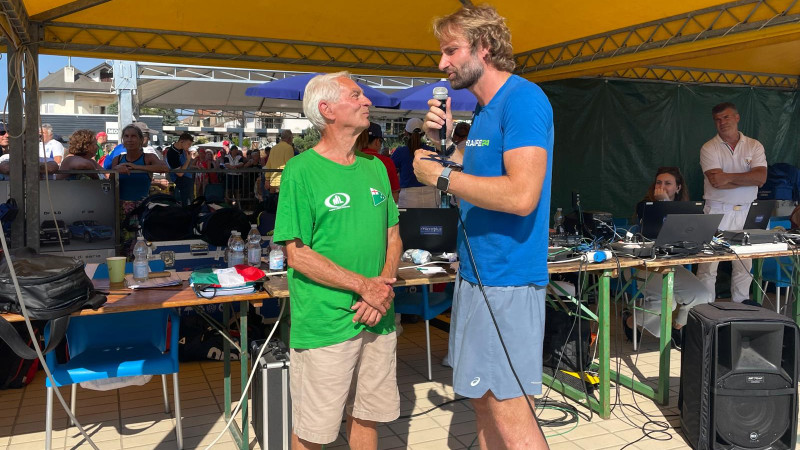
Inizia il week end che porterà alla conclusione del quarantesimo campionato italiano master di nuoto, il primo con l’inserimento della categoria più giovane, master 20, che allarga la forbice degli agonisti e praticanti, rispondendo alle tante, continue, richieste di un movimento nazionale ed internazionale sempre più numeroso ed appassionato. Tra ex azzurri e personaggi dello spettacolo, sono tanti i volti famosi che si incontrano allo Stadio del Nuoto di Riccione, diventata meta fissa stagionale per la stragrande maggioranza degli atleti master delle discipline acquatiche. C’è anche Lino Borello, colui che è stato tra i pionieri del nuoto master, premiato dagli organizzatori ed intervistato dal campione olimpico di Sydney 2000 Massimiliano Rosolino per la gioia di tutti.
Venerdì 28 giugno - Carol Smith si conferma primatista italiana
Le gare del mattino aprono la kermesse del fine settimana con oltre 2700 presenze gara individuali e 264 staffette e la 4x50 mixed con il coinvolgimento di 1056 atleti dagli 85enni ai 20enni. Continua il cammino con i record italiani della M25 Jennifer Martiradonna chiude la tripletta: 100 stile libero con 58”12 e 50 farfalla in 28”14. Conferma la presenza anche quet’anno la “Perla di Labuam”, Lady Marianna Carol Smith che in prima frazione della staffetta 4x50 mista mi fa registrare il tempo di 44”09 che vale il nuovo record italiano dei 50 dorso.
Ad un soffio dal record italiano, in un inedito 100 stile libero, Susanna Sordelli guadagna il terzo titolo italiano non migliorando il record di categoria che risaliva al 2019 per soli 20 centesimi. In campo maschile si distinguono le prestazioni di Lorenzo Ferrari (M25) con il suo 26”72 nei 50 dorso e l’ex azzurro Luca Belfiore (M50) che ferma i cronometri a 26”73; ambedue segnano le migliori prestazioni nazionali.
Gran finale di giornata con la staffetta 4x50 mixed, categoria M120, della Klab Sport con Jennifer Martiradonna, Nicholas Righetto, Niccolò Baldi e Eleonora Chiti che stabiliscomo il primato nazionale portandolo a 1’53”68.
Giovedì 27 giugno – Marzena Kulis european record women
Dopo la pioggia di mercoledì le gare ripartono sotto un sole splendente con i 200 rana che contano in acqua 300 atleti. In campo femminile da evidenziare in primis il record europeo di Marzena Kulis (M60) con il tempo di 3’02”66 (guadagnando oltre 1000 punti) a cui fa compagnia il record italiano di Elisa Celli (M30) che blocca il cronometro dopo 2’3”04. Nella stessa gara 48 prestazioni, che corrispondono da oltre il 15% di tutti i risultati, superano i 900 punti.
Seguono i 200 farfalla con 130 iscritti e 13 prestazioni che si avvicinano a quota mille, tra le quali la prova della inossidabile Franca Bosisio (categoria M55) che supera l’asticella dei 1000 punti – 1033 – e con il tempo 2’38”72 si ferma ad un secondo dal record italiano che le appartiene dallo scorso anno. Ancora Franca Bosisio che nel pomeriggio fa il bis nei 200 misti stabilendo il nuovo primato in 2’41”26 e anche in questa gara supera i 1000 punti.
In capo maschile c’è la new entry tra i detentori di record italiano: il dottor Paolo Inghirami (M70) che ferma il cronometro a 3’02”28. La giornata vede scendere in acqua gli stile liberisti veloci sulla distanza dei 200 metri, in attesa di venerdì, quando si cimenteranno nei 100 e sabato pomeriggio nella distanza più breve. Intanto Mario Cautiero (M30) migliora i record italiano con 1’55”4.
Risultati completi
Campionati Nuoto Herbalife. 3700 in vasca. Si apre con 7 record
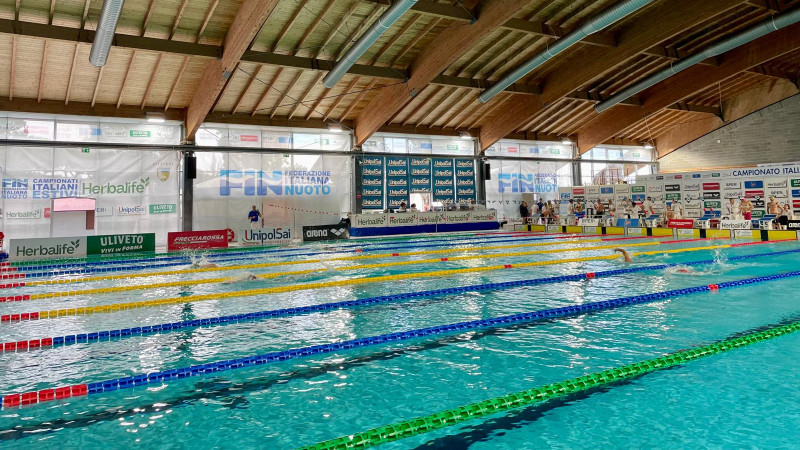
Il Campionato Italiano Master Herbalife di nuoto spegne 40 candeline. Allo Stadio del Nuoto di Riccione si nuota fino a domenica 30 giugno in un’atmosfera di festa, sport, benessere e condivisione.
L'edizione 2024 festeggia il quarantesimo anniversario con numeri da record: 3697 iscritti, di cui 1402 donne e 2295 uomini, rappresentanti di 355 società provenienti da tutta Italia e un totale di 8595 presenze gara.
Per la prima volta nella storia dei tricolori degli over, è presente la categoria M20, con 236 iscritti, tra cui il veneto Edoardo Guggi, il più giovane del campionato, che compirà 20 anni il prossimo 25 dicembre. Tra i veterani più importanti come tradizione, risultati ed età anagrafica Eleonora Liello, icona del nuoto napoletano, Livio Iarabek e Pier Lodovico Cappeletti, iscritti nella categoria M90.
Numeri che testimoniano la vitalità e l'entusiasmo che animano il movimento Master confermandolo come un punto di riferimento del nuoto italiano. Una tradizione che continua a rinnovarsi e crescere, coinvolgendo sempre più appassionati in tutta Italia. Negli ultimi lustri, inoltre, questa crescita ha coinvolto anche le manifestazioni di lunga distanza, creando un'osmosi tra le vasche clorate e le acque libere.
SUBITO 7 RECORD. Nella giornata inaugurale, martedì 25 giugno, il record europeo M25 di Marco Rossi (Klab Sport) negli 800 stile libero con 8’27”45, i record italiani M65 di Salvatore Nania (La Meridiana Sport) nei 400 misti con 6’09”40 e M25 di Jennifer Martiradonna (Jlab Sport) nei 100 farfalla con 1’02”52; quelli nei 200 M80 di Giuseppe Avallone (Flaminio SC) con 3’42”75, M85 di Alfio Visani (Klab Sport) con 4’08”70, M25 di Luigi Paciolla (Quadrifoglio SC) con 2’07”96 e M70 di Orietta Negri (Nuotatori Trentini) con 3’25”79.
LA PRIMA GARA del programma è stata quella degli 800 stile libero in cui si sono cimentati 315 atleti (139 donne e 176 uomini) con il primo testa-coda di categoria: nella M20, presente per la prima volta ai campionati, sono scesi in acqua cinque master a cui si è contrapposta dall’altro lato della piramide demografica, la prova del novantenne Pier Lodovico Cappelletti (Polisportiva Garden Rimini) che ha chiuso la gara in 24’07”75. Il primo record italiano ed europeo della manifestazione fatto registrare da Marco Rossi (M25) con il tempo di 8’27”45 ha superato la soglia dei 1000 punti (1005,28).
Programma e risultati completi
I Master festeggiano 40 anni: da Albaro al record 2024
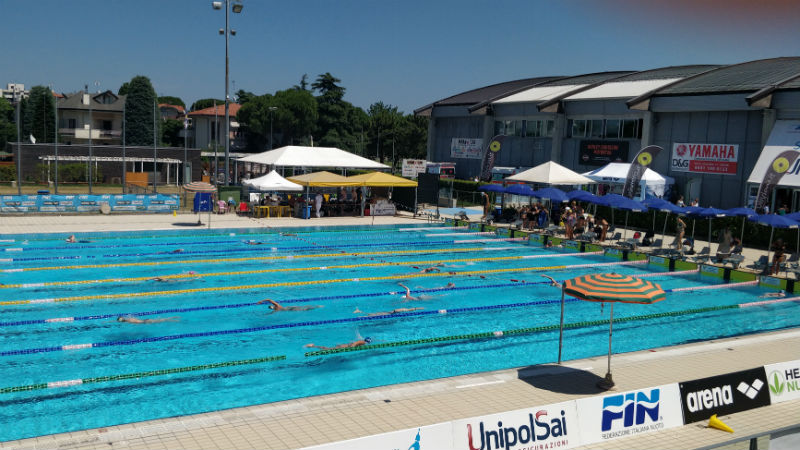
Il 23 giugno 1984 segna una data storica per il nuoto italiano: la prima giornata del primo Campionato Italiano Master. Oggi, quarant'anni dopo, ricordiamo quel debutto avvenuto nella vasca di Albaro a Genova, dove 300 atleti, alcuni dei quali sono diventati leggende del nuoto master italiano, in rappresentanza di 38 società, si sono dati battaglia. Tra questi pionieri, spiccano nomi come Lino Borello, al tempo tecnico della nazionale italiana in procinto di preparare i bagagli per le Olimpiadi di Los Angeles, e icone del nuoto italiano e del movimento master come Sandra Valle, Rita Androsoni, Alba Caffarena Christian Schollmeier, Riccardo Siniscalco, Mario Occhiello e i pallanuotisti Dante Rossi e Fofò Bonocore. Alcuni di loro hanno continuato a frequentare i Campionati per molti anni e tra loro possiamo sicuramente trovare chi scenderà ancora in acqua a distanza di 40 anni.
Quel primo campionato rappresentò l'apice di un percorso iniziato nel 1975 con il primo meeting delle "vecchie glorie", organizzato dalla Sportiva Sturla grazie all'iniziativa del presidente Federico Battezzati e del tecnico Lino Borello. Già con l’edizione dell’anno successivo furono gettate le basi regolamentari tuttora in uso, come la suddivisione degli atleti nelle attuali categorie, poi ripresa a livello internazionale con i primi campionati europei del 1987. Il campionato del 1984 segnò anche l'inizio di una nuova era. Nel 1983, infatti, la Federazione Italiana Nuoto riconobbe ufficialmente la categoria Masters, inserendola nel nuovo settore propaganda. Da allora, il movimento è cresciuto esponenzialmente, sia in termini di partecipazione che tecnici.
Ora, alla vigilia del 40esimo Campionato Italiano Master Herbalife, in programma a Riccione dal 25 al 30 giugno, possiamo guardare con orgoglio a una storia che ha visto tante generazioni di atleti, dagli ex agonisti agli amatori, affacciarsi alla competizione. Negli ultimi lustri, questa crescita ha coinvolto anche le manifestazioni di fondo, creando un'osmosi tra le vasche clorate e le acque libere.
L'edizione 2024 festeggia il quarantesimo anniversario con numeri da record: 3.697 iscritti, di cui 1.402 donne e 2.295 uomini, rappresentanti di 355 società provenienti da tutta Italia, per un totale di 8.595 presenze gara. Per la prima volta, è presente la categoria M20, con 236 iscritti, tra cui il veneto Edoardo Guggi, il più giovane del campionato, che compirà 20 anni il prossimo Natale. Non mancano i veterani come Eleonora Liello, icona del nuoto napoletano, Livio Iarabek e Piero Cappeletti, iscritti nella categoria M90. Questi numeri testimoniano la vitalità e l'entusiasmo che animano il movimento Master, confermandolo come un punto di riferimento per il nuoto italiano. Una tradizione che, partita dalla vasca di Albaro, continua a rinnovarsi e crescere, coinvolgendo sempre più appassionati in tutta Italia.
Si ringrazia Claudio Tomasi
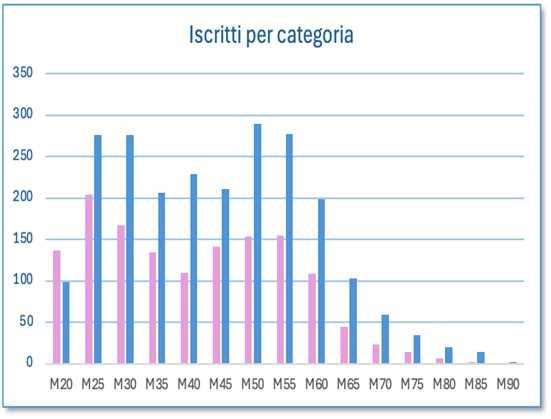
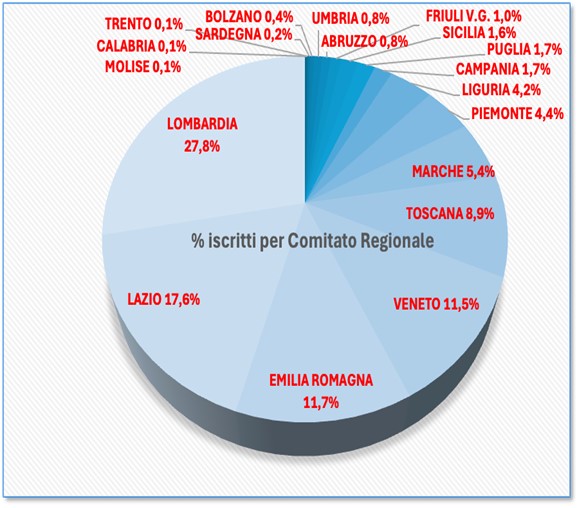
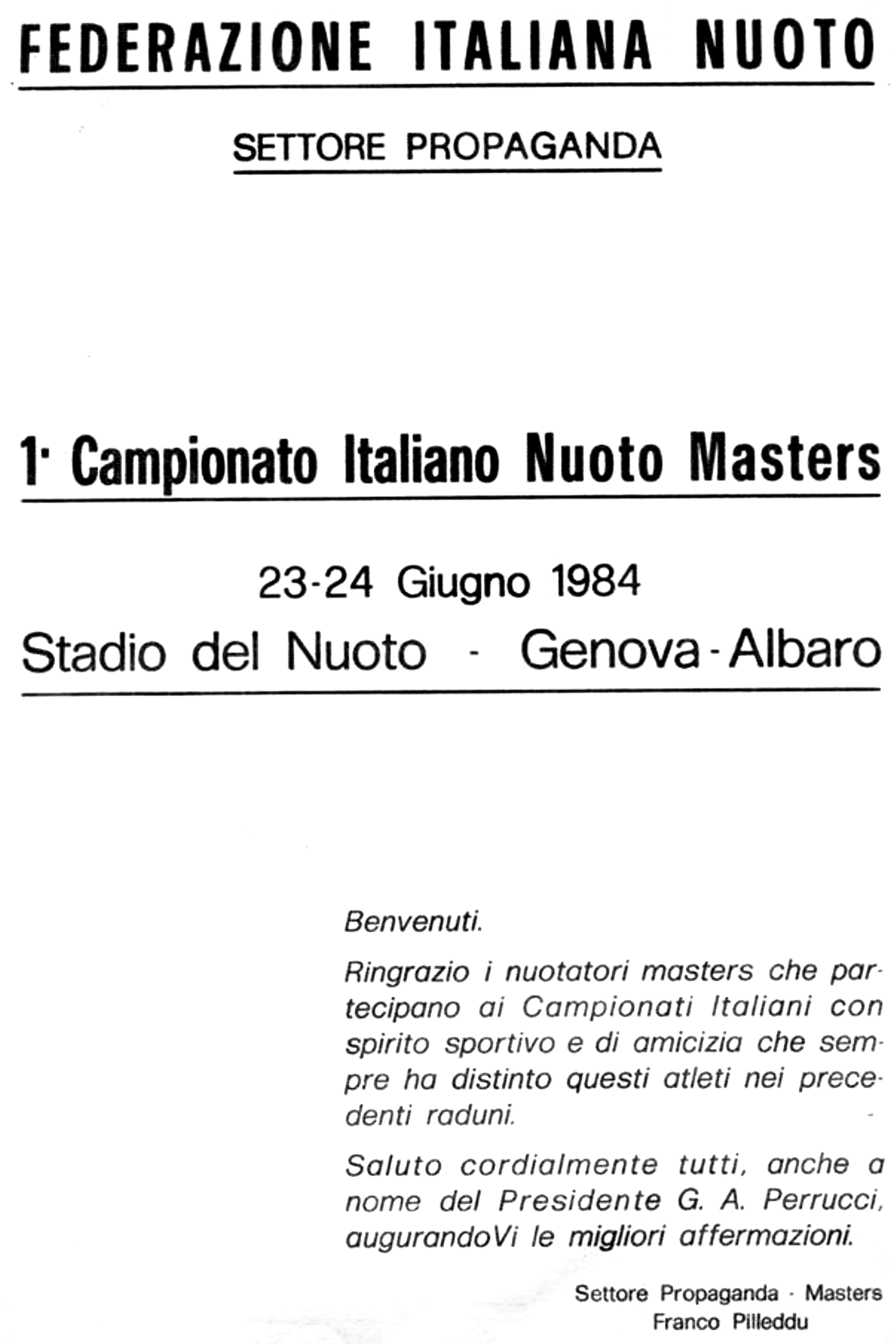
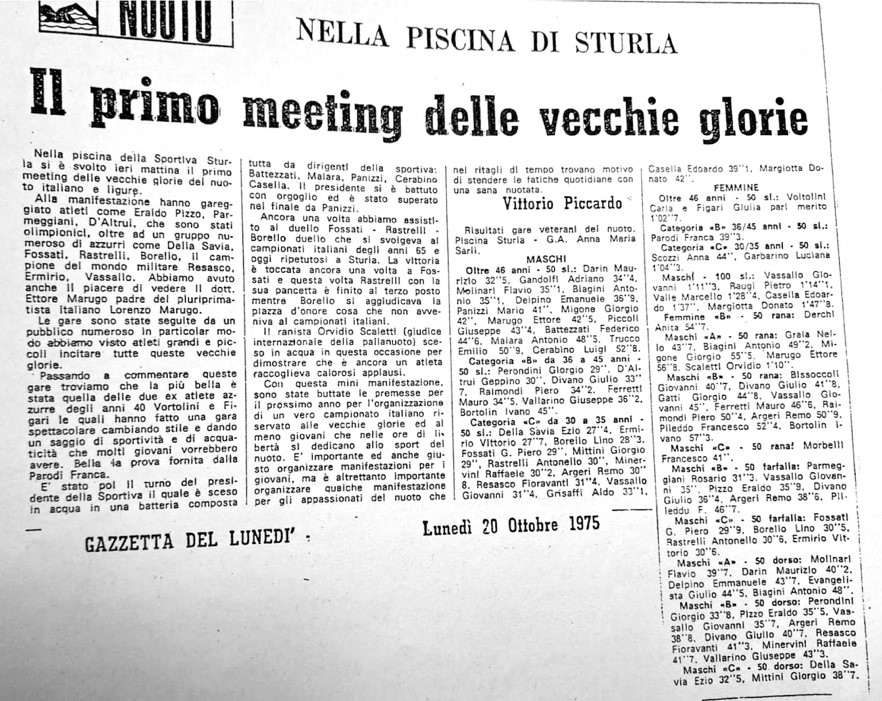
Trofeo Bud Spencer. 1100 atleti e 8 record nella seconda edizione
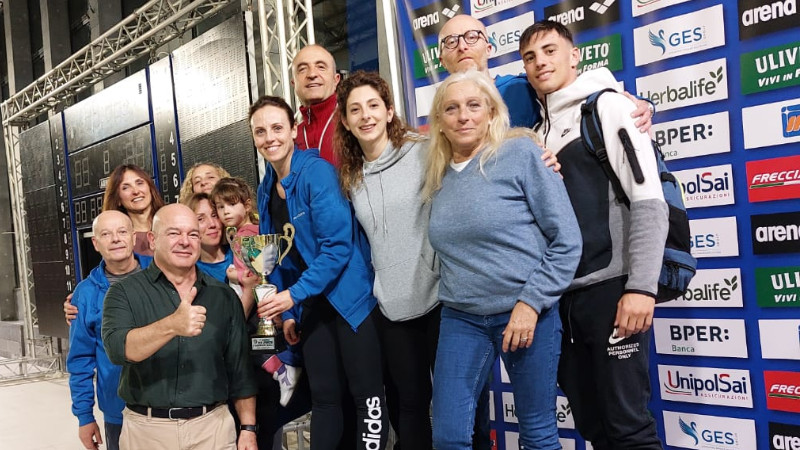
Otto record italiani in vasca corta e una cornice di pubblico straordinaria hanno caratterizzato la seconda edizione del trofeo Bud Spencer di nuoto master, tappa del circuito super-master federale. Una domenica di sport e condivisione presso il Centro Federale – Polo Acquatico Frecciarossa di Ostia nel meeting promosso ed organizzato dalla Europa Sporting del presidente Cinzia Farina e del vice presidente Roberto Migliori ed al quale hanno partecipato oltre 1100 atleti di 90 società.
Online risultati e classifiche, tra cui spiccano i record italiani di Giuseppe Avallone (Flaminio SC) nei 100 dorso M80 con 1’32”85 (44”99 ai 50 metri), Maurizio Tersar (CC Aniene) nei 100 dorso M45 con 58”45 (28”30 al passaggio di metà gara) e nei 50 dorso con 27”42, Stefano Ancarani (Imolanuoto) nei 200 misti M30 con 2’03”96 e nei 50 rana con 28”11, Christine Jolly (Flaminio SC) nei 100 stile libero M75 con 1’36”50, Jennifer Martinadonna (Klab Sport) nei 100 stile libero M25 con 57”65 e Antonio D’Oppido (Flaminio SC) nei 50 stile libero M80 con 34”64.
A premiare vincitori e primatisti italiani il figlio di Bud Spencer, Giuseppe, che si è complimentato con la società organizzatrice, la Federazione Italiana Nuoto e la direzione del Centro Federale per l’ottima riuscita della manifestazione e la particolare attenzione rivolta al papà Carlo e a tutta la famiglia Pedersoli.
Risultati
La scheda di Carlo Pedersoli (alias, Bud Spencer). Nasce a Napoli il 31 ottobre 1929. Celebre attore italiano, particolarmente noto per i suoi film in coppia con Mario Girotti (alias, Terence Hill) ed ex-nuotatore e pallanotista, più volte campione italiano a rana e stile libero. Già da piccolo si appassiona allo sport in genere dimostrando evoluta predisposizione. Nel 1937 diventa membro di un club locale di nuoto e vince alcuni premi. Successivamente si trasferisce con la famiglia prima a Roma, dove si distingue come ranista nelle categorie giovanili, e poi in Venezuela. Torna in Italia verso la fine degli anni '40 e, da atleta della S.S. Lazio Nuoto, diventa campione italiano di nuoto a rana nelle categorie giovanili (1945) senza disdegnare la pallanuoto. Successivamente si specializza nei 100 stile libero diventando il primo italiano a infrangere la barriera del minuto nel 1950, anno in cui partecipa ai campionati europei di Vienna arrivando quinto. Nel frattempo riprende gli studi iscrivendosi all'Università di Roma, alla facoltà di Giurisprudenza. Viene anche notato dall'ambiente cinematografico per la sua struttura fisica ed il suo esordio avviene con la grande produzione hollywoodiana “Quo Vadis?” del 1951 in cui interpreta un centurione dell'impero romano. Continua ad allenarsi e ad alternarsi tra nuoto e pallanuoto. Nella primavera del 1951 partecipa a una lunga tournée in Germania con la Lazio. Per la pallanuoto gioca solo le amichevoli poiché la federazione impedisce agli "atleti-nuotatori sotto controllo federale" di giocare in campionato, ma a causa di un infortunio di Geminio Ognio viene schierato contro lo Sturla, quindi squalificato con relativa multa alla società. Cambiati i regolamenti, comincia a praticare anche la pallanuoto con continuità. L'anno successivo gareggia alle Olimpiadi di Helsinki 1952 raggiungendo le semifinali nei 100 stile libero. Dopo i Giochi finlandesi, insieme ad altri promettenti atleti, viene invitato alla Yale University e trascorre alcuni mesi a New Haven, nel Connecticut, negli Stati Uniti dove porta il primato personale sul non ufficiale 57"7. Centravanti titolare della Lazio segna gol a raffica nel campionato del 1953 giungendo terzo nella classifica cannonieri (27 reti) e contribuendo al quarto posto in classifica. Le buone prestazioni lo portano a debuttare in Nazionale e in una partita contro la Spagna a Genova, il 30 settembre, segna tutte e cinque le reti del successo azzurro. L'anno successivo contrae una seria forma di periostite che non gli consente di difendere il titolo di campione italiano dei 100 stile libero che aveva già vinto 4 volte e di avere un rendimento altalenante nella pallanuoto. La stagione dopo conquista la medaglia d'oro ai Giochi del Mediterraneo di Barcellona. Nel frattempo la sua presenza nel mondo del cinema diventa sempre più apprezzata sottraendo spazio allo sport seppur alle Olimpiadi di Melbourne del 1956 riesce a ottenere un buon undicesimo posto nei 100 stile libero.
Nonostante i numerosi impegni, sportivi e non, Carlo consegue la Laurea in Legge. Nel 1958 lascia l’Italia e per un anno lavora a un progetto della Panamericana, la strada che attualmente collega Panama a Buenos Aires. Nel 1959 torna in Patria e si dedica alla composizione di colonne sonore, ottenendo un contratto con la RCA. Nel 1960 sposa Maria Amato, figlia di un grande produttore cinematografico. Riluttante al cinema, continua ad occuparsi di musica fino al 1967, quando prende il via la sua carriera. In quell'anno Giuseppe Colizzi, suo vecchio amico, gli offre una parte in un film e, dopo qualche esitazione, Pedersoli accetta. Sul set conosce il suo partner di lavoro, un giovane attore con all'attivo varie pellicole, ma in ruoli secondari e sconosciuto al grande pubblico: è Mario Girotti, suo futuro inseparabile compagno, meglio noto come Terence Hill. Il film "Dio perdona... io no!" è la prima pellicola della coppia, diventata poi nel tempo inossidabile per questo genere di produzioni. Le due star nelle presentazioni in locandina decidono di cambiare i propri nomi, considerati troppo italiani per fare colpo a livello internazionale, per rendere più credibili le opere e i personaggi interpretati. Gli pseudonimi che li renderanno celebri sono, rispettivamente, quelli di “Bud Spencer” e di “Terence Hill”. Negli anni seguenti la coppia gira numerosi film assieme, soprattutto del genere spaghetti-western. Parallelamente al cinema, Pedersoli porta avanti le sue passioni fra le quali anche quella del volo: nel 1975 infatti consegue la licenza di pilota di elicottero per l'Italia, la Svizzera e gli Stati Uniti. Da ricordare è anche il suo amore per la musica: nel 1977 scrive alcune canzoni per "Lo chiamavano Bulldozer", delle quali una viene da lui stesso interpretata durante il film. Negli ultimi anni, Pedersoli dimostra ampiamente le sue qualità di attore drammatico, dedicandosi anche a film impegnati come "Cantando dietro i paraventi" (2003) di Ermanno Olmi e "Uccidere è il mio mestiere", una produzione tedesca dove interpreta il maestro di un assassino completamente cieco. Nel 1979 riceve il premio Jupiter come star più popolare in Germania. Nel 2004 diventa testimonial della Federazione Italiana Nuoto. Nel 2005 il Comune di Civitavecchia gli attribuisce il Caimano d'Oro "per la sua carriera di nuotatore, e per essere rimasto sempre vicino a questo sport anche quando è diventato un attore affermato e conosciuto in tutto il mondo". Carlo Pedersoli sceglie il suo soprannome "Bud Spencer" in onore del suo idolo, Spencer Tracy, e per la sua birra preferita, la Budweiser. Ci lascia il 27 giugno 2016, a 86 anni.
Trofeo Bud Spencer. Domenica ad Ostia la seconda edizione
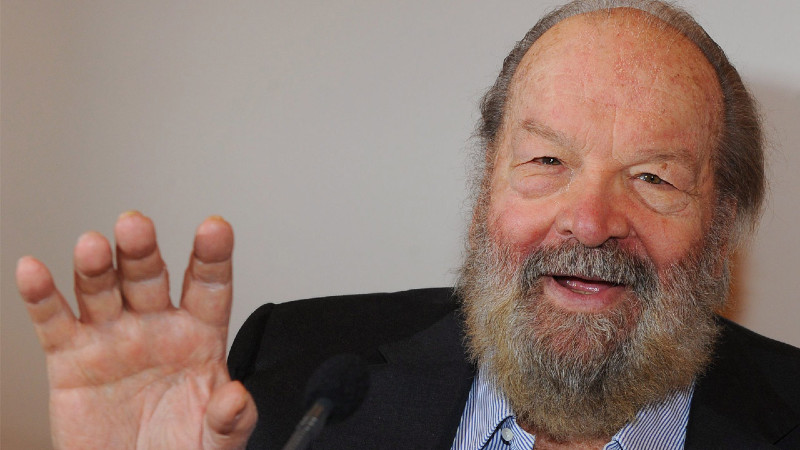
Tutto pronto per l’appuntamento di domenica 17 marzo al Centro Federale – Polo Acquatico Frecciarossa di Ostia per il Trofeo Bud Spencer. Oltre 1100 atleti di 90 società animeranno il ricordo dell’atleta e attore, grande appassionato di sport, sempre vicino alla Federazione Italiana Nuoto e tutte le sue discipline. Numeri eccezionali che certificano il successo straordinario della seconda edizione del Memorial dedicato al nostro Carlo Pedersoli, giunto alla seconda edizione e inserito all’interno del circuito master federale e organizzato dall’Europa Sporting Association.
Sarà una grande festa con uno sconfinato entusiasmo per uno degli eventi Master più partecipati di questa stagione. Inizio gare in vasca da 25 metri alle 9.00 con i 50 farfalla, 100 dorso, 100 rana, 50 stile libero e 200 misti.
pdf
Startlist
La scheda di Carlo Pedersoli (alias, Bud Spencer). Nasce a Napoli il 31 ottobre 1929. Celebre attore italiano, particolarmente noto per i suoi film in coppia con Mario Girotti (alias, Terence Hill) ed ex-nuotatore e pallanotista, più volte campione italiano a rana e stile libero. Già da piccolo si appassiona allo sport in genere dimostrando evoluta predisposizione. Nel 1937 diventa membro di un club locale di nuoto e vince alcuni premi. Successivamente si trasferisce con la famiglia prima a Roma, dove si distingue come ranista nelle categorie giovanili, e poi in Venezuela. Torna in Italia verso la fine degli anni '40 e, da atleta della S.S. Lazio Nuoto, diventa campione italiano di nuoto a rana nelle categorie giovanili (1945) senza disdegnare la pallanuoto. Successivamente si specializza nei 100 stile libero diventando il primo italiano a infrangere la barriera del minuto nel 1950, anno in cui partecipa ai campionati europei di Vienna arrivando quinto. Nel frattempo riprende gli studi iscrivendosi all'Università di Roma, alla facoltà di Giurisprudenza. Viene anche notato dall'ambiente cinematografico per la sua struttura fisica ed il suo esordio avviene con la grande produzione hollywoodiana “Quo Vadis?” del 1951 in cui interpreta un centurione dell'impero romano. Continua ad allenarsi e ad alternarsi tra nuoto e pallanuoto. Nella primavera del 1951 partecipa a una lunga tournée in Germania con la Lazio. Per la pallanuoto gioca solo le amichevoli poiché la federazione impedisce agli "atleti-nuotatori sotto controllo federale" di giocare in campionato, ma a causa di un infortunio di Geminio Ognio viene schierato contro lo Sturla, quindi squalificato con relativa multa alla società. Cambiati i regolamenti, comincia a praticare anche la pallanuoto con continuità. L'anno successivo gareggia alle Olimpiadi di Helsinki 1952 raggiungendo le semifinali nei 100 stile libero. Dopo i Giochi finlandesi, insieme ad altri promettenti atleti, viene invitato alla Yale University e trascorre alcuni mesi a New Haven, nel Connecticut, negli Stati Uniti dove porta il primato personale sul non ufficiale 57"7. Centravanti titolare della Lazio segna gol a raffica nel campionato del 1953 giungendo terzo nella classifica cannonieri (27 reti) e contribuendo al quarto posto in classifica. Le buone prestazioni lo portano a debuttare in Nazionale e in una partita contro la Spagna a Genova, il 30 settembre, segna tutte e cinque le reti del successo azzurro. L'anno successivo contrae una seria forma di periostite che non gli consente di difendere il titolo di campione italiano dei 100 stile libero che aveva già vinto 4 volte e di avere un rendimento altalenante nella pallanuoto. La stagione dopo conquista la medaglia d'oro ai Giochi del Mediterraneo di Barcellona. Nel frattempo la sua presenza nel mondo del cinema diventa sempre più apprezzata sottraendo spazio allo sport seppur alle Olimpiadi di Melbourne del 1956 riesce a ottenere un buon undicesimo posto nei 100 stile libero.
Nonostante i numerosi impegni, sportivi e non, Carlo consegue la Laurea in Legge. Nel 1958 lascia l’Italia e per un anno lavora a un progetto della Panamericana, la strada che attualmente collega Panama a Buenos Aires. Nel 1959 torna in Patria e si dedica alla composizione di colonne sonore, ottenendo un contratto con la RCA. Nel 1960 sposa Maria Amato, figlia di un grande produttore cinematografico. Riluttante al cinema, continua ad occuparsi di musica fino al 1967, quando prende il via la sua carriera. In quell'anno Giuseppe Colizzi, suo vecchio amico, gli offre una parte in un film e, dopo qualche esitazione, Pedersoli accetta. Sul set conosce il suo partner di lavoro, un giovane attore con all'attivo varie pellicole, ma in ruoli secondari e sconosciuto al grande pubblico: è Mario Girotti, suo futuro inseparabile compagno, meglio noto come Terence Hill. Il film "Dio perdona... io no!" è la prima pellicola della coppia, diventata poi nel tempo inossidabile per questo genere di produzioni. Le due star nelle presentazioni in locandina decidono di cambiare i propri nomi, considerati troppo italiani per fare colpo a livello internazionale, per rendere più credibili le opere e i personaggi interpretati. Gli pseudonimi che li renderanno celebri sono, rispettivamente, quelli di “Bud Spencer” e di “Terence Hill”. Negli anni seguenti la coppia gira numerosi film assieme, soprattutto del genere spaghetti-western. Parallelamente al cinema, Pedersoli porta avanti le sue passioni fra le quali anche quella del volo: nel 1975 infatti consegue la licenza di pilota di elicottero per l'Italia, la Svizzera e gli Stati Uniti. Da ricordare è anche il suo amore per la musica: nel 1977 scrive alcune canzoni per "Lo chiamavano Bulldozer", delle quali una viene da lui stesso interpretata durante il film. Negli ultimi anni, Pedersoli dimostra ampiamente le sue qualità di attore drammatico, dedicandosi anche a film impegnati come "Cantando dietro i paraventi" (2003) di Ermanno Olmi e "Uccidere è il mio mestiere", una produzione tedesca dove interpreta il maestro di un assassino completamente cieco. Nel 1979 riceve il premio Jupiter come star più popolare in Germania. Nel 2004 diventa testimonial della Federazione Italiana Nuoto. Nel 2005 il Comune di Civitavecchia gli attribuisce il Caimano d'Oro "per la sua carriera di nuotatore, e per essere rimasto sempre vicino a questo sport anche quando è diventato un attore affermato e conosciuto in tutto il mondo". Carlo Pedersoli sceglie il suo soprannome "Bud Spencer" in onore del suo idolo, Spencer Tracy, e per la sua birra preferita, la Budweiser. Ci lascia il 27 giugno 2016, a 86 anni.
Mondiali a Doha. L'analisi del nuoto master azzurro
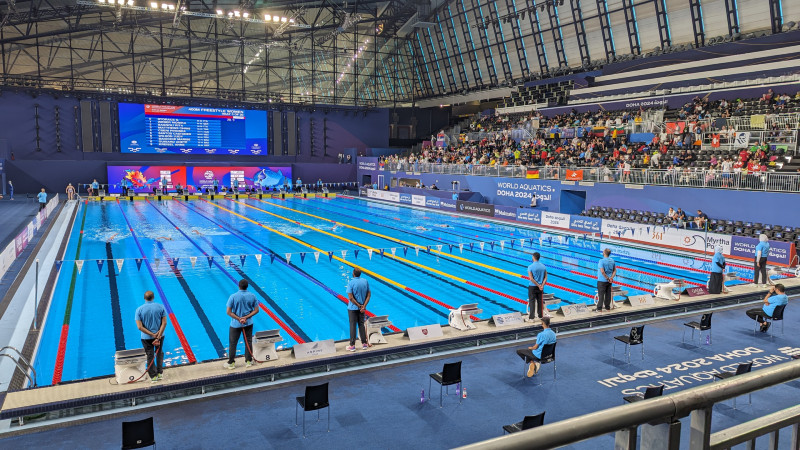
La folta rappresentanza italiana, nella piscina Aspire Dome a Doha, è salita 134 volte sul podio (53 ori, 44 argenti e 37 bronzi) collocandosi al secondo posto della classifica generale, immediatamente alle spalle dei rappresentanti delle squadre tedesche che fanno meglio per 2 podi. Volgendo lo sguardo alle altre rappresentative non si può non segnalare la qualità delle performance degli atleti australiani che conquistano medaglie in quasi la metà delle prove individuali a cui hanno partecipato (47%), seguiti dai master statunitensi con un 38% di performances da medaglia e dagli atleti NIA (Neutral Individual Athletes) con il loro 34%.
Per una analisi più approfondita delle gare si è proceduto ad applicare ad ogni risultato il punteggio tabellare utilizzato in Italia nelle gare del Circuito Supermaster e nelle prove di campionato italiano: ciò consente di disporre di un criterio univoco per confrontare le diverse gare indipendentemente dalle categorie di appartenenza degli atleti.
In generale il punteggio medio complessivo degli atleti italiani è stato di 867 punti, in linea con quello globale di 862 punti a testimonianza del valore raggiunto, nel complesso, dal movimento master nazionale. Da evidenziare il punteggio conseguito nelle gare dei misti dai master italiani che con 904 punti è significativamente superiore al livello generale di 881 punti.
Le prestazioni superiori ai 1000 punti sono state 82 in campo femminile, di cui 7 delle atlete italiane, e 101 tra gli uomini, di cui 12 dei nostri atleti; valori complessivi pressoché equivalenti considerando il numero di presenze gara: 3240 per gli uomini e 2289 per le donne. Per quanto riguarda i master italiani sono da ascrivere 15 nuovi record nazionali: 8 in campo femminile di cui 3 record europei (Franca Bosisio nei 50 dorso e farfalla e Cristina Tarantino nei 400 stile libero) e 7 tra gli uomini.
Volgendo l’attenzione alle TOP 20 prestazioni femminili risalta il 18° posto di Franca Bosisio con il tempo di 2'37"37 conseguito nei 200 farfalla (1042 punti). Da sottolineare i risultati delle statunitensi Mary Case ed Ellen Reynolds che entrano in questa speciale classifica con tutte le prove a cui hanno partecipato. La ottantacinquenne Mary Case guida la classifica con 1186 punti nei 50 farfalla e si aggiudica ben 3 delle prime 4 posizioni coprendo tutte e 3 le distanze della farfalla. L’altra statunitense, Ellen Reynolds, da prova della sua ecletticità entrando in questa speciale classifica con tutte e 5 le gare a cui ha partecipato, passando dal dorso ai misti per chiudere con i 200 rana. In campo maschile grande evidenza per il nostro Carlo Travaini che per solo una manciata di punti (4) non conquista la cima della classifica che è andata ad appannaggio dell’ottantenne ceco Rudolf Smerda (1073 punti). Tra i due atleti è stato un confronto a tutto campo: Rudolf entra in classifica con tutte e 3 le distanze del delfino in cui ha gareggiato; analogamente anche Carlo Travaini si inserisce con le 3 prove a rana a cui va aggiunta la notevole prestazione nei 200 misti, che gli è valsa il 18° posto in classifica.
Raffrontando le prestazioni maschili con quelle femminili ed estendendo il confronto fino alla 50° posizione in classifica, si constata – in base alla media dei punteggi – un livello qualitativo più elevato in campo femminile con una media di 1049 punti contro i 1035 riscontrati in campo maschile.
Volgendo l’attenzione alle TOP20 prestazioni italiane, in campo femminile la parte del leone la ha svolta Franca Bosisio che occupa le prime quattro posizioni della classifica, permettendosi di inserire nelle TOP20 nazionali anche la quinta prova: i 200 stile libero (19°). Eccellenti le prestazioni della toscana Manuela Maltinti che in ambedue le prove dei misti supera i 1000 punti. Da evidenziare la costanza dei risultati delle romane Daniela Petracchi e di Elena Piccardo che insieme a Daniela Deponti sono inserite in questa particolare classifica con ben 3 prove. In campo maschile si assiste a quanto riscontrato in campo femminile: Carlo Travaini emula Franca Bosisio occupando i primi quattro posti della classifica nazionale dei TOP20. Alle 4 performances di Travaini fanno da riscontro le 3 prove di Filippo Magnini, con la piccola sorpresa del risultato dei 50 rana che – dal punto di vista del punteggio – è da preferire alla prova cronometrica dei 50 stile libero.
Confrontando le classifiche internazionali dei TOP20 con quelle nazionali e osservando le categorie degli atleti e atlete inseriti, si può evidenziare come il movimento italiano sconti una certa debolezza nelle categorie più anziane a fronte di una significativa presenza di atleti delle fasce di età intermedie da M45 a M60, tant’è che solo due atleti, uno in campo maschile e l'altra in campo femminile, sono over 60.
E’ possibile che tale situazione sia da ascrivere, oltre ad aspetti socio-culturali che incidono in modo significativo verso una costante pratica sportiva anche in età avanzata come avviene nei paesi anglosassoni e nel nord Europa, anche alla storia della pratica del nuoto nel nostro paese nel corso degli anni ’60 e ’70, attività svolta da un nucleo limitato e privilegiato di atleti e che solo negli ultimi decenni dello scorso secolo è divenuta una pratica di massa, ampiamente consigliata dai medici e trascinata dai notevoli e costanti risultati degli azzurri in campo internazionale, alimentando così il filone del mondo master.
Infine, alcune considerazioni meritano gli aspetti organizzativi. In primo luogo, il programma gare proposto da World Aquatics per i mondiali Master evidenzia alcune criticità ben testimoniate da alcuni dati di fatto: le gare dell’ultima giornata dei campionati, 400 misti, 200 stile libero e 50 farfalla, hanno registrato i più alti indici di assenza pari al 17% degli iscritti. Sarebbe forse opportuna una revisione del programma gare, iniziando dal prevedere una continuità delle gare dello stile libero posizionando i 200 stile libero nella giornata centrale della manifestazione come spartiacque tra le gare più lunghe (800 e 400) e quelle di velocità (100 e 50).
Sicuramente da apprezzare l’accoglienza degli atleti con disponibilità di generi di conforto lungo tutta la manifestazione a cui peraltro ha fatto riscontro una gestione della giornata delle staffette caratterizzata da forti ritardi rispetto a quanto programmato (in alcuni casi di oltre un'ora e mezza) e difficoltà nella gestione degli spazi riservati alla prechiamata quantunque il numero dei partecipanti non fosse particolarmente elevato.
Si ringrazia per la collaborazione Claudio Tomasi
pdf Analisi delle gare di nuoto
Mondiali a Doha. Italia a quota 115 medaglie. Magnini tris d'oro
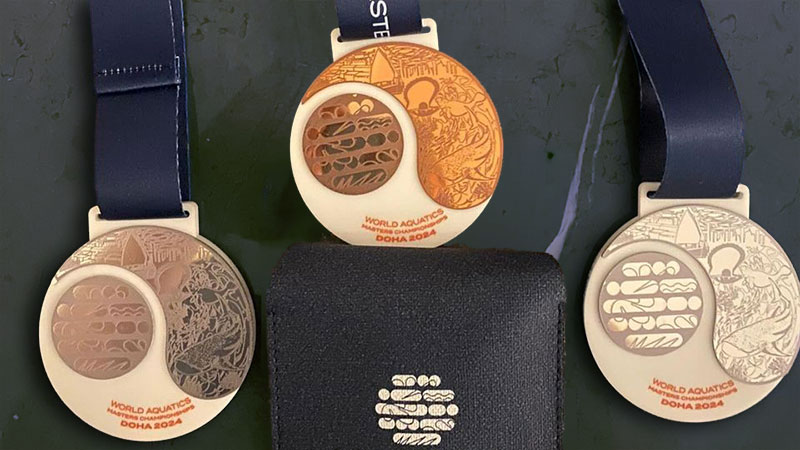
Superata quota cento. Nella settima giornata dei mondiali master a Doha gli azzurri conquistano 20 medaglie che si aggiungono alle 95 precedenti per un totale di 115. E rimangono tre giorni di competizioni per incrementare il bottino. C’è anche un podio tutto italiano, quello dei 200 misti M 55-59 vinti da Alberto Montini (Nuoto Master Brescia) con 2’28”31, seguito da Silio Fabbrini (Swim In Action) con 2’30”96 e Antonello Laveglia (Forum Sport Center) con 2’31”24.
Tripletta d’oro di Filippo Magnini che, dopo il successo nei 100 stile libero e 50 rana, vince i 50 stile libero M 40-44 in 23”53, di nuovo davanti al russo dei Nuotatori Indipendenti Associati Andrei Kurnosov (23”58) e al brasiliano del team Bardi & Okuda Jose Sanches Junior (23”92), già battuti martedì nei 100. Quella del pesarese, ex capitano azzurro e bicampione mondiale dei 100 stile libero a Montreal 2005 e Melbourne 2007, 42 anni che nuota per l’Acqua13, è la terza vittoria personale in tre giorni e la quarantesima medaglia d’oro in ordine di tempo del team Italia ai mondiali master delle discipline acquatiche in Qatar.
Il medagliere italiano complessivo è di 115 medaglie: 45 d’oro, 38 d’argento e 32 di bronzo. Le gare di nuoto proseguono fino al 3 marzo, il torneo di pallanuoto si chiude il 2 marzo e quello di nuoto artistico venerdì 1 marzo. Le competizioni di tuffi e nuoto in acque libere si sono concluse.
Finali 4^ giornata nuoto
50 stile libero F
M 55-59
1. Daniela Deponti (Acqua1 Village) 29”38
50 stile libero M
M 40-44
1. Filippo Magnini (Acqua13) 23”53
200 misti F
M 65-69
3. Susanna Sordelli (Flaminio SC) 3’17”87
M 55-59
1. Manuela Maltinti (Nuoto Valdinievole) 2’41”43
2. Daniela Deponti (Acqua1 Village) 2’47”64
200 misti M
M 85-89
2. Giuseppe Fantini (Polisportiva Garden) 4’40”22
M 60-64
1. Carlo Tavani (Acqua1 Village) 2’25”97
M 55-59
1. Alberto Montini (Nuoto Master Brescia) 2’28”31
2. Silio Fabbrini (Swim In Action) 2’30”96
3. Antonello Laveglia (Forum SC) 2’31”24
M 35-39
3. Lorenzo Giovannini (Nuoto Master Brescia) 2’12”80
M 30-34
2. Stefano Ancarani (Imolanuoto) 2’10”52
3. Enrico Cardinale (Nuoto Club Sassuolo) 2’13”84
100 farfalla F
M 55-59
1. Franca Bosisio (Team Trezzo Sport) 1’09”30
M 25-29
1. Jennifer Martinadonna (Klab Sport) 1’03”37
100 farfalla M
M85-89
2. Giuseppe Fantini (Polisportiva Garden) 2’27”52
M 55-59
3. Mauro Cappelletti (Chiavari Nuoto) 1’02”73
M 30-34
2. Niccolò Baldi (Klab Sport) 56”15
Finali 5^ giornata nuoto artistico
Doppio Free F
M 50-59
1. Milena Mercante-Stefania Carla Gallazzi (Buso Nuoto) 65.3667 (ex 19.3000, imp 26.2667, dif 19.8000)
M 40-49
2. Michela Barabini-Alessia Fornasi (QSwim) 66.0000 (18.3000, 27.2000, 20.5000)
M 30-39
4. Serena Vandone-Irene Mincuzzi (Busto Nuoto) 66.1000 (19.3000, 26.4000, 20.4000)
(Cecilia Novazzi – riserva)
Risultati 5^ giornata torneo pallanuoto M
M 70+ & 75+ Girone G
Nuotatori Civitavecchiesi-Blue Thunder Master 12-0 (4-0, 3-0, 3-0, 2-0)
M 45+ Girone B
Veterani Kosice-Firenze Pallanuoto 8-6 (0-0, 3-2, 1-3, 4-1)
M 55+ Girone D
Kazakistan Masters-Europa Sporting 55 5-7 (2-0, 1-1, 1-3, 1-3)
M 60+ Girone E
Blau-Weiss Bochum-Europa Sporting 60 9-6 dtr (3-1, 0-2, 0-1, 2-1 - 4-1)
Risultati completi
Mondiali a Doha. Magnini vince i 100 sl col record dei campionati
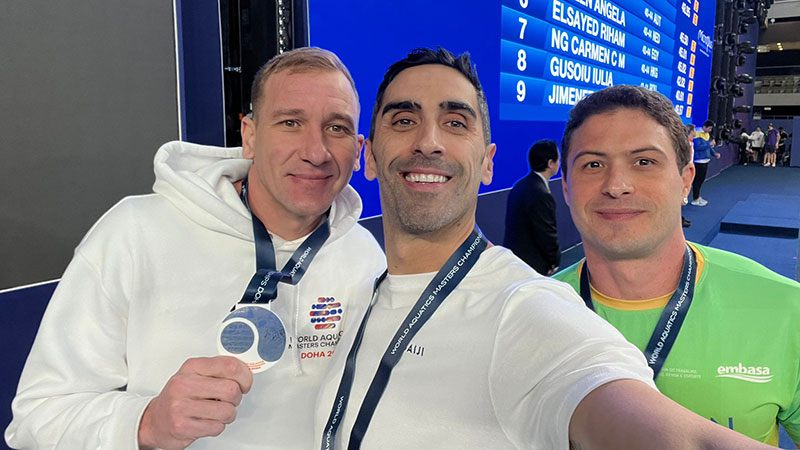
La quinta giornata dei campionati del mondo master a Doha e seconda del nuoto è nel segno di Filippo Magnini. Nella vasca della Aspire Dome l’ex capitano della Nazionale, nato a Pesaro 42 anni fa, tesserato con Acqua 13, bicampione del mondo dei 100 stile libero a Montreal 2005 e Melbourne 2007, conquista la medaglia d’oro iridata anche nei 100 stile libero master. Nella categoria M 40-44 vince con 51”05 (24”66 al passaggio dei 50 metri) stabilendo il record dei campionati. Alle sue spalle il russo Andrei Kurnosov, che nuota per i Nuotatori Indipendenti Associati, e chiude in 52”60; terzo il brasiliano Jose Sanches Junior con 52.94. Nella stessa categoria l’altro italiano Simone Bonistalli (CC Aniene) è dodicesimo con 56”85.
Nella seconda giornata delle gare di nuoto, che proseguono fino a domenica 3 marzo, 24 medaglie italiane. Le gare di tuffi si sono concluse oggi con l'argento conquistato dagli over 100 Giuseppe La Magna Zimmerman e Marco Raimondo (Nuotatori Genovesi) dai tre metri sincro categoria M100+ con 156.54 punti. Davanti a loro gli statunitensi Martin John Lundie e Alex Lapidus con 159.69. Le gare di nuoto artistico proseguono fino all'1 marzo e il torneo di pallanuoto si chiude il 2 marzo. Il medagliere italiano complessivo dopo cinque giornate ha raggiunto quota 63 medaglie (23 d'oro, 25 d'argento e 15 di bronzo).
Finali 2^ giornata nuoto
200 dorso F
M 65-70
3. Susanna Sordelli (Flaminio SC) 3'15"20
M 55-59
2. Manuela Maltinti (Nuoto Vandinievole) 2’45”11
3. Jane Hoag (Acqua1 Village) 2’48”45
M 40-44
3. Manuela Antonioli (Forum SC) 2’37”00
M 30-34
2. Francesca Braghini (Aquareal) 2’29”86
M 25-29
1. Giorgia Malandruccio (Fondazione Bentegodi) 2’36”39
200 dorso M
M 70-74
1. Ettore Boschetti (Idea Sport) 2’46”17 Record Campionati
M 55-59
2. Mauro Cappelletti (Chiavari Nuoto) 2’29”65
M 45-49
2. Maurizio Tersar (CC Aniene) 2’16”32
100 stile libero F
M 50-55
1. Daniela Deponti (Acqua1 Village) 1’05”45
M 25-29
1. Jennifer Martinadonna (Klab Sport) 58”75
100 stile libero M
M 40-44
1. Filippo Magnini (Acqua13) 51”05 Record Campionati
M 30-34
2. Nicholas Carlo Righetto (Klab Sport) 53”31
100 rana F
M 60-64
2. Daniela Petracchi (Roma Nuoto Master) 1’27”22
M 50-54
1. Sabina Vitaloni (Derthona Nuoto) 1’20”42
M 35-39
1. Elena Piccardo (Roma Nuoto Master) 1’14”41
M 30-34
3. Alice Vignudini (Amici Nuoto VVF Modena) 1’17”13
100 rana M
M 60-64
1. Carlo Travaini (Acqua1 Village) 1'09"96
M 55-59
1. Fabio Spinadin (Nottoli Nuoto) 1'10"54
3. Silio Fabbrini (Swim In Action) 1'13"64
M 50-54
1. Pablo Emiliano Gallazzi (CC Aniene) 1'12"25
M 35-39
2. Davide Domenichini (Imolanuoto) 1'07"52
M 30-34
1. Stefano Ancarani (Imolanuoto) 1'04"66
2. Edoardo Gatti (Centro Nuoto Bastia) 1'04"80
M 25-29
2. Marco Giglio (Amici Nuoto VVF Modena) 1'04"94
Risultati 3^ giornata torneo pallanuoto M
M45+ Girone B
Firenze Pallanuoto-Satellity 23-10 (4-3, 5-2, 6-4, 8-1)
M 60+ Girone E
Europa Sporting 60-Real Canoe 60 16-4 (4-2, 2-0, 5-1, 5-1)
M 70+ & 75* Girone G
Nuotatori Civitavecchiesi 70-SV Cannstat 70 5-0 (1-0, 1-0, 1-0, 2-0)
M 55+ Girone D
Europa Sporting 55-Imperial Sport 10-7 (4-1, 2-1, 3-4, 1-1)
M 65+ Girone F
Europa Sporting 65-HZC De Robben 3-11 (1-2, 1-3, 0-3, 1-3)
Finali 5^ ed ultima giornata tuffi
Trampolino 3 metri sincro M
M 100+
2. Giuseppe La Magna Zimmerman-Marco Raimondo 156.54
(Nuotatori Genovesi)
Trampolino 3 metri sincro F
M 100+
5. Monica Andrenacci-Ilaria De Cecco 140.04
(Nuotatori Genovesi)
Risultati completi
